- Home
- J. D. Salinger
Franny and Zooey Page 5
Franny and Zooey Read online
Page 5
Last month, Dean Sheeter (whose name usually transports Franny when I mention it) approached me with his gracious smile and bull whip, and I am now lecturing to the faculty, their wives, and a few oppressively deep-type undergraduates every Friday on Zen and Ma-hayana Buddhism. A feat, I haven't a doubt, that will eventually win me the Eastern Philosophy Chair in Hell. The point is, I'm now on the campus five days a week instead of four, and what with my own work at nights and on weekends, I have almost no time to do any elective thinking. Which is my plaintive way of saying that I do worry about you and Franny when I get a chance, but not nearly so often as I'd like to. What I'm really trying to tell you is. that Bessie's letter had very little to do with my sitting down in a sea of ashtrays to write to you today. She shoots me some priority information about you and Franny every week and I never do anything about it, so it isn't that. What brings this on is something that happened to me at the local supermarket today. (No new paragraph. I'll spare you that.) I was standing at the meat counter, waiting for some rib lamb chops to be cut. A young mother and her little girl were waiting around, too. The little girl was about four, and, to pass the time, she leaned her back against the glass showcase and stared up at my unshaven face. I told her she was about the prettiest little girl I'd seen all day. Which made sense to her; she nodded. I said I'd bet she had a lot of boy friends. I got the same nod again. I asked her how many boy friends she had. She held up two fingers. "Two!" I said. "That's a lot of boy friends. What are their names, sweetheart?" Said she, in a piercing voice, "Bobby and Dorothy." I grabbed my lamb chops and ran. But that's exactly what brought on this letter--much more than Bessie's insistence that I write to you about Ph.D.s and acting. That, and a haiku-style poem I found in the hotel room where Seymour shot himself. It was written in pencil on the desk blotter: "The little girl on the plane/ Who turned her doll's head around/ To look at me." With these two things on my mind, I thought as I was driving home from the supermarket that at long last I could write to you and tell you why S. and I took over your and Franny's education as early and as highhandedly as we did. We've never put it into words for you, and I think it's high time one of us did. But now I'm not so sure I can do it. The little girl at the meat counter is gone, and I can't quite see the polite face of the little doll on the plane. And the old horror of being a professional writer, and the usual stench of words that goes with it, is beginning to drive me out of my seat. It seems terribly important to try, though.
The age differences in the family always seemed to add unnecessarily and perversely to our problems. Not really between S. and the twins and Boo Boo and me, but between the two twosomes of you and Franny and S. and me. Seymour and I were both adults--he was even long out of college--by the time you and Franny were both able to read. At that stage, we had no real urge even to push our favorite classics at the two of you--not, anyway, with the same gusto that we had at the twins or Boo Boo. We knew there's no keeping a born scholar ignorant, and at heart, I think, we didn't really want to, but we were nervous, even frightened, at the statistics on child pedants and academic weisenheimers who grow up into faculty-recreation-room savants. Much, much more important, though, Seymour had already begun to believe (and I agreed with him, as far as I was able to see the point) that education by any name would smell as sweet, and maybe much sweeter, if it didn't begin with a quest for knowledge at all but with a quest, as Zen would put it, for no-knowledge. Dr. Suzuki says somewhere that to be in a state of pure consciousness--satori--is to be with God before he said, Let there be light. Seymour and I thought it might be a good thing to hold back this light from you and Franny (at least as far as we were able), and all the many lower, more fashionable lighting effects--the arts, sciences, classics, languages--till you were both able at least to conceive of a state of being where the mind knows the source of all light. We thought it would be wonderfully constructive to at least (that is, if our own "limitations" got in the way) tell you as much as we knew about the men--the saints, the arhats, the bodhisattvas, the jivanmuktas--who knew something or everything about this state of being. That is, we wanted you both to know who and what Jesus and Gautama and Lao-tse and Shankaracharya and Hui-neng and Sri Ramakrishna, etc., were before you knew too much or anything about Homer or Shakespeare or even Blake or Whitman, let alone George Washington and his cherry tree or the definition of a peninsula or how to parse a sentence. That, anyway, was the big idea. Along with all this, I suppose I'm trying to say that I know how bitterly you resent the years when S. and I were regularly conducting home seminars, and the metaphysical sittings in particular. I just hope that one day--preferably when we're both blind drunk--we can talk about it. (Meantime, I can only say that neither Seymour nor I ever had a notion, that far back, that you were going to grow up into an actor. We should have, no doubt, but we didn't. If we had, I feel certain S. would have tried to do something constructive about it. Surely somewhere there must be a special prep course for Nirvana and points East designed strictly for actors, and I think S. would have found it.) The paragraph should close, but I can't stop muttering. You'll wince at what comes next, but come it must. I think you know that I had the best intentions of checking in now and then after S.'s death to see how you and Franny were holding up. You were eighteen, and I didn't worry about you overly. Although I did hear from a gossipy little snip in one of my classes that you had a reputation in your college dorm for going off and sitting in meditation for ten hours at a time, and that made me think. But Franny was thirteen at the time. I simply couldn't move, though. I was afraid to come home. I wasn't afraid you'd both, in tears, take up a position across the room and fire the complete set of Max Mueller's Sacred Books of the East at me, one by one. (Which would have been masochistic ecstasy for me, probably.) But I was afraid of the questions (much more than the accusations) you might both put to me. As I remember very well, I let a whole year go by after the funeral before I came back to New York at all. After that, it was easy enough to come in for birthdays and holidays and be reasonably sure that questions would run to when my next book would be finished and had I done any skiing lately, etc. You've even both been up here on many a weekend in the last couple of years, and though we've talked and talked and talked, we've all agreed not to say a word. Today is the first time I've really wanted to speak up. The deeper I get into this goddam letter, the more I lose the courage of my convictions. But I swear to you that I had a perfectly communicable little vision of truth (lamb-chop division) this afternoon the very instant that child told me her boy friends' names were Bobby and Dorothy. Seymour once said to me--in a crosstown bus, of all places--that all legitimate religious study must lead to unlearning the differences, the illusory differences, between boys and girls, animals and stones, day and night, heat and cold. That suddenly hit me at the meat counter, and it seemed a matter of life and death to drive home at seventy miles an hour to get a letter off to you. Oh, God, how I wish I'd grabbed a pencil right there in the supermarket and not trusted the roads home. Maybe it's just as well, though. There are times when I think you've forgiven S. more completely than any of us have. Waker once said something very interesting to me on that subject--in fact, I'm merely parroting what he said to me. He said you were the only one who was bitter about S.'s suicide and the only one who really forgave him for it. The rest of us, he said, were outwardly unbitter and inwardly unforgiving. That may be truer than true. How can I know? All I do know for certain is that I had something happy and exciting to tell you--and on just one side of the paper, doublespaced--and I knew when I got home that it was mostly gone, or all gone, and there was nothing left to do but go through the motions. Lecture you on Ph.D.s and the actor's life. How messy, how funny, and how Seymour himself would have smiled and smiled--and probably assured me, and all of us, not to worry about it.
Enough. Act, Zachary Martin Glass, when and where you want to, since you feel you must, but do it with all your might. If you do anything at all beautiful on a stage, anything nameless and joy-making, anyth
ing above and beyond the call of theatrical ingenuity, S. and I will both rent tuxedos and rhinestone hats and solemnly come around to the stage door with bouquets of snapdragons. In any case, for what little it's worth, please count on my affection and support, at whatever distance.
--buddy
As always, my passes at omniscience are absurd, but you, of all people, should be polite to the part of me that comes out merely clever. Years ago, in my earliest and pastiest days as a would-be writer, I once read a new story aloud to S. and Boo Boo. When I was finished, Boo Boo said flatly (but looking over at Seymour) that the story was "too clever." S. shook his head, beaming away at me, and said cleverness was my permanent affliction, my wooden leg, and that it was in the worst possible taste to draw the group's attention to it. As one limping man to another, old Zooey, let's be courteous and kind to each other.
Much love, B.
THE last, the under, page of the four-year-old letter was stained a sort of off-cordovan color, and it was torn in two places along the folds. Zooey, finished reading, treated it with some little care as he put the letter back into page-one order. He tapped the pages, to even them out, against his dry knees. He frowned. Then, mercurially, as though he'd read the letter, by God, for the last time in his life, he stuffed it like so much excelsior into its envelope. He placed the thick envelope on the side of the tub and began to play a little game with it. With one finger he tapped the loaded envelope back and forth along the tub edge, seeing, apparently, if he could keep it in motion without letting it fall into the tub water. After a good five minutes of this, he gave the envelope a faulty tap and had to reach out quickly and grab it. Which ended the game. Keeping the retrieved envelope in his hand, he sat lower, deeper, in the water, letting his knees submerge. He stared abstractedly for a minute or two at the tiled wall beyond the foot of the tub, then glanced at his cigarette on the soapcatch, picked it off, and took a couple of test drags on it, but it had gone out. He sat up again, very abruptly, with a great slosh of tub water, and dropped his dry left hand over the side of the tub. A typewritten manuscript was lying, face up, on the bathmat. He picked it up and brought it aboard, as it were. He stared at it briefly, then inserted his four-year-old letter in the middle pages, where the stapling in a manuscript is tightest. He then propped the manuscript against his now wet knees, an inch or so above the waterline, and began to turn the pages. When he came to page 9, he folded the manuscript, magazine-style, and began to read or to study.
The role of "Rick" had been heavily underlined with a soft-lead pencil.
tina (morosely): Oh, darling, darling, darling. I'm not much good to you, am I?
rick: Don't say that. Don't ever say that, you hear me?
tina: It's true, though. I'm a jinx. I'm a horrible jinx. If it hadn't been for me, Scott Kincaid would have assigned you to the Buenos Aires office ages ago. I spoiled all that. (Goes over to window) I'm one of the little foxes that spoil the grapes. I feel like someone in a terribly sophisticated play. The funny part is, I'm not sophisticated. I'm not anything. I'm just me. (Turns) Oh, Rick, Rick, I'm scared. What's happened to us? I can't seem to find us anymore. I reach out and reach out and we're just not there. I'm frightened. I'm a frightened child. (Looks out window) I hate this rain. Sometimes I see me dead in it.
rick (quietly): My darling, isn't that a line from "A Farewell to Arms"?
tina (Turns, furious): Get out of here. Get out! Get out of here before I jump out of this window. Do you hear me?
rick (grabbing her): Now you listen to me. You beautiful little moron. You adorable, childish, self-dramatizing--
Zooey's reading was suddenly interrupted by his mother's voice--importunate, quasi-constructive--addressing him from outside the bathroom door: "Zooey? Are you still in the tub?"
"Yes, I'm still in the tub. Why?"
"I want to come in for just a teeny minute. I have something for you."
"I'm in the tub, for God's sake, Mother."
"I'll just be a minute, for goodness' sake. Pull the shower curtain."
Zooey took a parting look at the page he had been reading, then closed the manuscript and dropped it over the side of the tub. "Jesus Christ almighty," he said. "Sometimes I see me dead in the rain." A nylon shower curtain, scarlet, with a design of canary-yellow sharps, flats, and clefs on it, was bunched up at the foot of the tub, attached with plastic rings to an overhead chromium bar. Sitting forward, Zooey reached for it and shot it the length of the tub, closing himself off from view. "All right. God. Come in if you're coming in," he said. His voice had no conspicuous actor's mannerisms, but it was rather excessively vibrant; it "carried" implacably when he had no interest in controlling it. Years earlier, as a child panelist on "It's a Wise Child," he had been advised repeatedly to keep his distance from the microphone.
The door opened, and Mrs. Glass, a medium-stout woman in a hairnet, sidled into the bathroom. Her age, under any circumstance, was fiercely indeterminate, but never more so than when she was wearing a hairnet. Her entrances into rooms were usually verbal as well as physical. "I don't know how you can stay in the tub the way you do." She closed the door behind her instantly, as someone does who has been waging a long, long war on behalf of her progeny against post-bath drafts. "It isn't even healthy," she said.
"Do you know how long you've been in that tub? Exactly forty-five--"
"Don't tell me! Just don't tell me, Bessie." "What do you mean, don't tell you?"
"Just what I said. Leave me the goddam illusion you haven't been out there counting the minutes I've--"
"Nobody's been counting any minutes, young man," Mrs. Glass said. She was already very busy. She had brought into the bathroom a small, oblong package wrapped in white paper and tied with gold tinsel. It appeared to contain an object roughly the size of the Hope diamond or an irrigation attachment. Mrs. Glass narrowed her eyes at it and picked at the tinsel with her fingers. When the knot didn't give, she applied her teeth to it.
She was wearing her usual at-home vesture--what her son Buddy (who was a writer, and consequently, as Kafka, no less, has told us, not a nice man) called her pre-notification-of-death uniform. It consisted mostly of a hoary midnight-blue Japanese kimono. She almost invariably wore it throughout the apartment during the day. With its many occultish-looking folds, it also served as the repository for the paraphernalia of a very heavy cigarette smoker and an amateur handyman; two oversized pockets had been added at the hips, and they usually contained two or three packs of cigarettes, several match folders, a screwdriver, a claw-end hammer, a Boy Scout knife that had once belonged to one of her sons, and an enamel faucet handle or two, plus an assortment of screws, nails, hinges, and ball-bearing casters--all of which tended to make Mrs. Glass chink faintly as she moved about in her large apartment. For ten years or more, both of her daughters had often, if impotently, conspired to throw out this veteran kimono. (Her married daughter, Boo Boo, had intimated that it might have to be given a coup de grace with a blunt instrument before it was laid away in a wastebasket.) However Oriental the wrapper had originally been designed to look, it didn't detract an iota from the single, impactful impression that Mrs. Glass, chez elle, made on a certain type of observer. The Glasses lived in an old but, categorically, not unfashionable apartment house in the East Seventies, where possibly two-thirds of the more mature women tenants owned fur coats and, on leaving the building on a bright weekday morning, might at least conceivably be found, a half hour or so later, getting in or out of one of the elevators at Lord & Taylor's or Saks or Bonwit Teller's. In this distinctly Manhattanesque locale, Mrs. Glass was (from an undeniably hoyden point of view) a rather refreshing eyesore. She looked, first, as if she never, never left the building at all, but that if she did, she would be wearing a dark shawl and she would be going in the general direction of O'Connell Street, there to claim the body of one of her half-Irish, half-Jewish sons, who, through some clerical error, had just been shot dead by the Black and Tans.
Zooey's voice sudden
ly and suspiciously spoke up: "Mother? What in Christ's name are you doing out there?"
Mrs. Glass had undressed the package and now stood reading the fine print on the back of a carton of toothpaste. "Just kindly button that lip of yours," she said, rather absently. She went over to the medicine cabinet. It was stationed above the washbowl, against the wall. She opened its mirror-faced door and surveyed the congested shelves with the eye--or, rather, the masterly squint--of a dedicated medicine-cabinet gardener. Before her, in overly luxuriant rows, was a host, so to speak, of golden pharmaceuticals, plus a few technically less indigenous whatnots. The shelves bore iodine, Mercurochrome, vitamin capsules, dental floss, aspirin, Anacin, Bufferin, Argyrol, Musterole, Ex-Lax, Milk of Magnesia, Sal Hepatica, Aspergum, two Gillette razors, one Schick Injector razor, two tubes of shaving cream, a bent and somewhat torn snapshot of a fat black-and-white cat asleep on a porch railing, three combs, two hairbrushes, a bottle of Wildroot hair ointment, a bottle of Fitch Dandruff Remover, a small, unlabelled box of glycerine suppositories, Vicks Nose Drops, Vicks VapoRub, six bars of castile soap, the stubs of three tickets to a 1946 musical comedy ("Call Me Mister"), a tube of depilatory cream, a box of Kleenex, two seashells, an assortment of used-looking emery boards, two jars of cleansing cream, three pairs oPS scissors, a nail file, an unclouded blue marble (known to marble shooters, at least in the twenties, as a "purey"), a cream for contracting enlarged pores, a pair of tweezers, the strapless chassis of a girl's or woman's gold wristwatch, a box of bicarbonate of soda, a girl's boarding-school class ring with a chipped onyx stone, a bottle of Stopette--and, inconceivably or no, quite a good deal more. Mrs. Glass briskly reached up and took down an object from the bottom shelf and dropped it, with a muffled, tinny bang, into the wastebasket. "I'm putting some of that new toothpaste they're all raving about in here for you," she announced, without turning around, and made good her word. "I want you to stop using that crazy powder. It's going to take all the lovely enamel off your teeth. You have lovely teeth. The least you can do is take proper--"

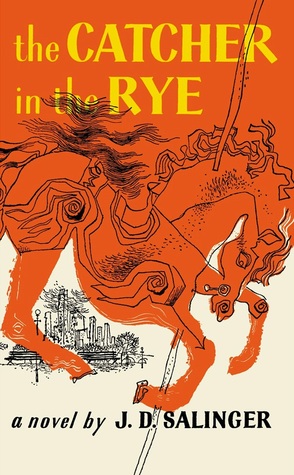 Catcher in the Rye
Catcher in the Rye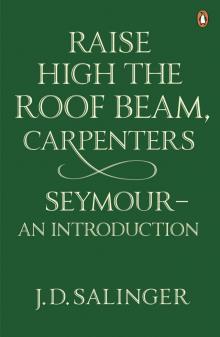 Raise High the Roof Beam, Carpenters & Seymour: An Introduction
Raise High the Roof Beam, Carpenters & Seymour: An Introduction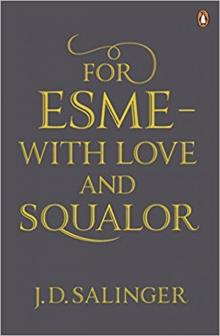 For Esmé, With Love and Squalor
For Esmé, With Love and Squalor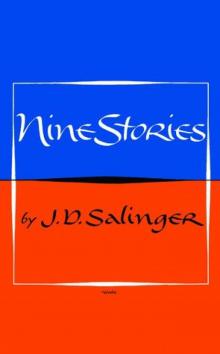 Nine Stories
Nine Stories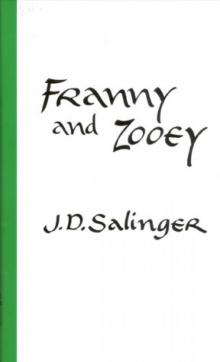 Franny and Zooey
Franny and Zooey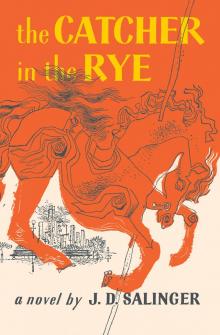 The Catcher in the Rye
The Catcher in the Rye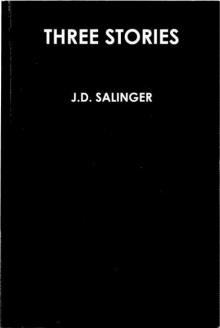 Three Stories
Three Stories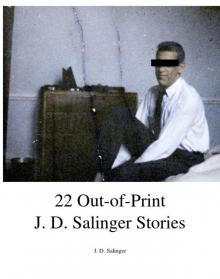 22 Out-of-print J. D. Salinger Stories
22 Out-of-print J. D. Salinger Stories